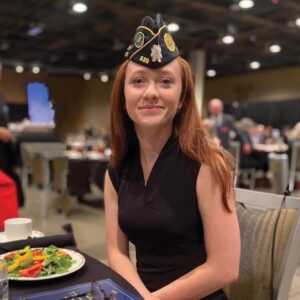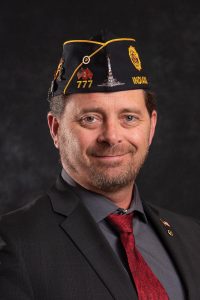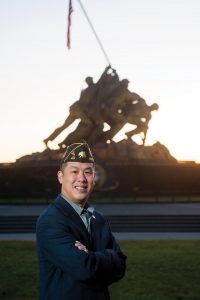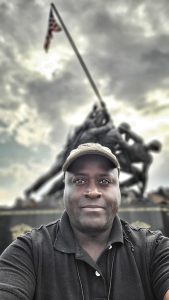
“There’s a Place for You in the American Legion”
By: Sara BockPosted on September 9, 2022
These Marine Vets are the Face of the Next Generation of Legionnaires
By Sara W. Bock
Finding Purpose
Elizabeth Hartman was five years out of the Marine Corps when, in 2019, she bumped into a Vietnam-era Marine veteran in the small town of New Bern, N.C., where she resides.
“Hey, Marine, you need to continue to serve—get off your butt and come help!” she recalls Ed Hughes saying as he encouraged her to join the local American Legion Post 539. Not one to refuse orders, the 31-year-old self-described “boot lance corporal,” who had heard people complain that the American Legion was little more than a bunch of old guys in a bar, decided to see for herself.

Elizabeth joined MCA’s Scuttlebutt Podcast to talk about the American Legion, Click Here to Listen
What she found defied every stereotype: a diverse group of veterans from all generations, a large segment of them fellow post-9/11 veterans, who were committed to supporting each other and continuing to serve their community and country even after hanging up their uniforms. Today, just three years after she first set foot in the door, Hartman serves both as the post’s commander and as Chair of the Legion’s National Legislative Council.
“Rank we leave at the door, we leave gender at the door, we leave race at the door. We just serve. And I think that’s what’s so beautiful because you can come in and you can just find that purpose,” said Hartman, who added that due to its proximity to Marine Corps Air Station Cherry Point, many of the post’s legionnaires are veteran Marines. “I would say a sense of purpose and a sense of belonging are the two things we frequently hear as what’s missing when someone separates from the Marine Corps. Joining an American Legion post, you belong, and you’re surrounded by people who get it.”
For Hartman, who served as an Arabic linguist during her time in the Corps and now works as a personal financial advisor, it’s important that Post 539 offers programming that appeals to all generations of Marines. The post has retained traditional offerings like Bingo nights and weekly gatherings at a bar, but also has added activities like a “Yak Attack” kayaking trip and an annual 22-mile hike that brings awareness to veteran suicide rates while raising funds for suicide prevention programming. Recently, when members of the post became aware that veterans’ headstones at a historically Black cemetery in the local area had fallen into disrepair and not been receiving the same honors and recognition as veterans in the nearby national cemetery, they procured grave cleaning kits from the Department of Veterans Affairs and spent two weekends cleaning up the headstones before holding a ceremony to render proper honors for those who had been laid to rest there.
“We put a flag by each, saluted, and said their name aloud to ensure they would get the honors they deserved. I was really proud of that one,” said Hartman, adding that the post has also found other ways to serve the community in recent months, including taking three homeless veterans off the street and helping them secure housing and jobs.
A pivotal experience for Hartman took place last summer in the wake of the attack at Hamid Karzai International Airport in Kabul, Afghanistan, on Aug. 26, which claimed the lives of 13 U.S. servicemembers who were assisting in the evacuation of America’s Afghan allies as the Taliban took control of the country. A week later, Post 539 held a town hall meeting for anyone who wanted to talk about what had transpired.
“We had GWOT [global war on terror] veterans crying because they were trying to cope with their feelings and emotions—two seats over you had a Vietnam veteran also crying because [of] seeing a photo of Kabul juxtaposed by Saigon,” Hartman recalled. “I think so often we see a different generation of veterans and we think, ‘They’re so different from me.’ But really, we’re the same and we are going through the exact same situations and emotions, and it’s imperative that we come together and view ourselves as one team.”
The efforts at Hartman’s post are reflective of a sea change at the highest levels of the national veteran service organization, which boasts 1.8 million members and more than 12,000 posts nationwide, as it navigates the challenge of attracting the next generation of veterans to join its ranks while ensuring that its older members continue to feel valued and seen. With a recently unveiled new logo, which does not replace its iconic star emblem but rather provides a secondary “brand mark,” the American Legion has its sights set on the future.
Addressing the Suicide CrisisFounded in 1919 by a small group of World War I veterans, the Legion has throughout its history not only provided a place for veterans to belong, but also has identified the biggest issue facing the next generation and figured out how to help solve or alleviate it. Historically, this has primarily been accomplished through lobbying efforts in Washington, D.C., where the Legion, which has one of the largest veterans lobbying groups, has played a vital role in ensuring that legislation that benefits veterans is signed into law.

“The WW I American Legion veteran set up the GI Bill for the World War II veteran, and then the WW II legionnaire took care of all the care and compensation around Agent Orange—that was the biggest issue facing the next generation,” said the Legion’s Chief Marketing Officer, Dean Kessel, who added that today, the core of the Legion’s members are Vietnam veterans who are continuing that tradition of paying it forward. “What is the biggest issue facing this generation of veteran? It’s suicide and mental health.”
Recognizing that this complex issue can’t be addressed solely through legislation, the American Legion recently rolled out its “Be the One” awareness and de-stigmatization campaign, which encourages individuals to, rather than quote the alarming number of daily veteran suicides, “be the one to save one veteran.”
“Be the one to ask veterans in your life how they are doing; to listen when a veteran needs to talk; to reach out when a veteran is struggling,” the campaign urges.

According to retired Marine Gunnery Sergeant Chanin Nuntavong, who sits at the helm of the Legion’s Washington, D.C., office as the executive director of government and veteran affairs, the organization instituted a new “Buddy Check” program at the local level several years ago, asking post members to call their fellow legionnaires to check on them and see if they need anything. Less than two years later, the stay-at-home orders that accompanied the COVID-19 pandemic made the Buddy Check concept even more vital.
“We found people who were older and needed groceries and needed help and support,” said Nuntavong, adding that at the time, the idea for the Be the One campaign had not yet been conceived. “We are incorporating the Be the One campaign into our Buddy Check program, so not only are we going to call and ask how you’re doing, but we’re really going to dive a little deeper and check on your mental health, making sure you have services if you need any, or any assistance that we can provide locally.”
Advocating on the HillNuntavong, who retired from the Corps in 2017 and previously served as public affairs advisor to the 17th Sergeant Major of the Marine Corps, Micheal P. Barrett, is responsible for overseeing the Legion’s lobbying arm and regularly testifies before Congress on matters concerning veterans. Since he assumed his current position, Nuntavong has had the opportunity to help ensure benefits for Blue Water Navy veterans who were exposed to Agent Orange and other herbicides while serving off the coast of Vietnam, as well as to testify in support of the recent Honoring our PACT Act, which will give the next generation of veterans harmed by toxins, largely from burn pits, presumption of service connection and access to earned benefits and healthcare. He and his team regularly meet with senators and members of the House of Representatives and review bills to determine their impact—both positive and negative—on those who have served. The Washington, D.C., office also employs nearly 50 individuals who work to process disability compensation claims and appeals for veterans, free of charge. In 2021 alone, the American Legion secured a staggering $14 billion in benefits for veterans.
“Quite honestly, no one is going to fight for our brothers and sisters in arms as much as the American Legion,” said Hartman, whose role on the organization’s National Legislative Council is to help ensure that veterans are aware of the Legion’s legislative agenda, know their services and resources available, and are encouraged to pick up the phone and call their representatives on matters that affect their fellow veterans.
Nuntavong understands that some individuals may be at a point in their lives where they don’t have the time or feel the need to participate in their local post, and he finds their sentiments completely valid. Still, he encourages all veterans to join the Legion because their membership fee—which is dependent on location but averages about $40 per year—helps support the organization’s lobbying efforts on the Hill and its important work in processing veteran claims.
“Membership matters. So, if you can donate your $30 to the Legion, you’re going to help us advocate, and then when you’re ready to walk in the door and contribute your time, we’ll be there for you,” said Nuntavong, who hopes to dispel the myth that the American Legion is little more than a smoky bar that serves cheap beer.
Staying RelevantWorking in the Los Angeles entertainment industry, Gulf War-era Marine veteran Jeff Daly had never even heard of the American Legion until five years ago when a friend invited him to attend a writing workshop with a group called Veterans in Media and Entertainment. The event was held at the Legion’s Hollywood Post 43— incidentally, the post at which Nuntavong is a member. The colossal art-deco style building is located just down the street from the Hollywood Bowl and is home to a multi-million dollar theater. Once referred to by The Wall Street Journal as “the coolest club in LA you can’t buy yourself into,” the structure made Daly’s eyes widen with interest.
“What is this place?” he remembers asking the person sitting next to him. Before he knew it, he too was a legionnaire and just recently became the commander of Post 43. Daly also is a co-host of the Legion’s national podcast, Tango Alpha Lima, in which he and fellow veterans have what he describes as “conversations that aren’t typically associated with the American Legion.”
“We talked about the George Floyd thing because the police officers were veterans. We’ve done Pride Month things, Black History Month things, women’s things,” said Daly of the podcast. “We’re speaking to two audiences: one’s internal and one’s external. Internal are the younger members or actually any members that we already have that have a perception, true or false, that the Legion’s losing its relevance. And then the external is to show prospective members that we’re not.”
Daly describes his post of 1,300 members as younger on average, but still representative of every living era, from World War II down to 18-year-olds who are serving on active duty.
“What drew me was the vibrance of all the members—because we have members of all ages—but [also] doing stuff,” said Daly. “We do professional development, because we’re in Hollywood that means we’re working with groups like Veterans in Media and Entertainment, because they bring in people to teach how to pitch a project, how to work with casting directors, get jobs behind the scenes in production. So we’re engaging people in the rest of their life, not just the memory of serving. That was important. […] That’s what brought me in. What’s kept me is that I also have learned to really latch on to the notion of continued service.”
When Daly suffered a stroke in March of this year, members of his post visited him every single day as he recovered.
“A lot of us, especially here, aren’t from here, don’t have family here, so this is a de facto family,” said Daly.
Rediscovering Identity
The Marine Corps was in the rearview mirror for Ron Neff, who retired as a sergeant major in 2017 and headed for corporate America.
“The people were magnificent, the pay was fantastic, but it didn’t take long. Like so many other veterans, I started to experience what I felt like was an existential crisis of identity. I felt like I didn’t have purpose, I wasn’t surrounded by Marines anymore to kind of remind me of my value to them and the organization, I began to worry about my own mental and physical health. And while things were going well with the new job on the surface, below the surface I was definitely looking, grasping for something more,” said the sergeant major, who served in Iraq and Afghanistan during his 24-year career.
A motorcycle enthusiast, Neff happened to be at a Harley-Davidson dealership near his home in Indianapolis, Ind., when a group of American Legion Riders rolled up. A fellow Marine he recognized from his time in the Corps was among them. The group invited him to visit the local post, which turned out to be less than a mile from his home, where he immediately joined and became a legionnaire.
“It kind of felt like you were hanging out with your Marines in the field or something. The flavors vary every day, but it was there, and you knew that if you needed to be transparent, to be yourself for a moment, whether it was a period of vulnerability or just pride and confidence in your service, there was somebody there that could listen,” said Neff of his experience at his post.
Within months of getting involved, Neff, who still was dissatisfied with his career path, noticed a position had opened at the American Legion National Headquarters in Indianapolis, and applied.
“Fortunately for me I got it and I kind of feel like a Marine all over again,” Neff, who serves as director of the Legion’s Americanism Division, said with a laugh.
Americanism is one of the Legion’s “pillars,” focused on the development of the nation’s most valuable resource: its youth. As director, Neff is responsible for youth programs that include American Legion Baseball, Junior Shooting Sports, Boys Nation, the National Oratorical Contest, Youth Cadet Law Enforcement and Scouting, as well as flag etiquette, youth scholarships and the child welfare foundation.
“It’s externally focused on the same population of great Americans that we served in uniform, so it’s like being that humble servant to Americans again, and not uniquely devoted to taking care of our fellow veterans,” said Neff of his work in the division. “That’s a mandate that never goes away, but Americanism from the American Legion is really externally focused and just selling the message that this country is beautiful and amazing, and patriotism is not partisan, and that’s why we serve, this country’s worth it, and we communicate that to others.”
Neff considers becoming a legionnaire to be an extension of service and encourages all veteran Marines who are searching for purpose to find a home in the American Legion.
“There is a common excitement when you walk out of uniform. You’re looking forward to living the ‘other life,’ so to speak. But in your excitement to leave, sometimes it’s lost upon you that when you’ve selflessly served others for so long it becomes a part of your identity, an innate characteristic or trait that doesn’t go away,” said Neff, adding these words aimed at his fellow veterans: “There’s a place for you in the American Legion.”





